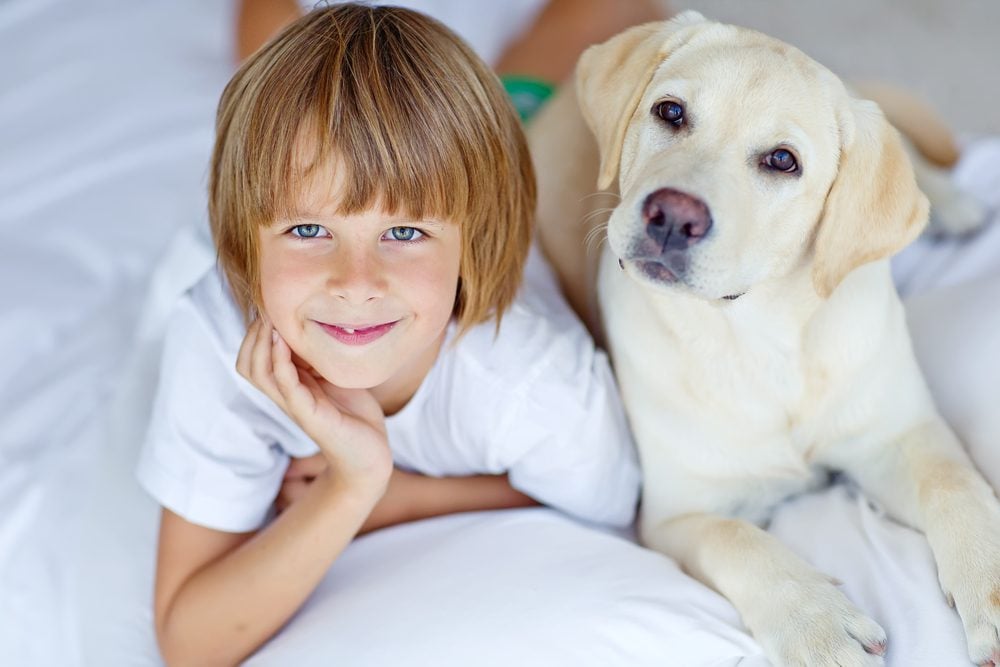Autism spectrum disorder (ASD) is an invisible disorder that affects around 1% of the population. While some people with autism may not appear to struggle, it doesn’t mean they don’t.
Furthermore, because autism is a spectrum, there are some people who are affected by it far more severely than others. While autism cannot be cured, people with it often undergo different types of therapies to help them learn how to better interact with the world around them.
Therapy may also be necessary for those who suffer from depression or anxiety, which are somewhat common in people on the autism spectrum. While all of these therapies can be extremely beneficial, there is one “treatment” that isn’t always talked about: dogs!
Dogs can be of great help to those with ASD. This is because not only do dogs provide unconditional love and unwavering friendship, but they can also provide comfort and reduce stress.
In this article, we’ll detail exactly how dogs can help people with autism, explain the different types of support animals, provide some guidance on how to choose the right breed, and finally, share which breeds we think are the best for those on the autism spectrum.
How Dogs Can Help
Autism is often characterized by difficulties with social communication and is usually diagnosed during childhood (as early as two years of age). Those with autism may speak at length without giving others a chance to respond, struggle to maintain eye contact, or use facial expressions and gestures that don’t appear to match with what is being said.
Because of this, adults and children with autism may find it difficult to form meaningful relationships. For some, this may lead to feelings of loneliness or inadequacy.
Though humans are particular about what is considered “normal” in terms of social cues, dogs are much more adaptable. Our four-legged friends are very observant and learn over time what our body language means just by watching us.
That is to say, dogs do not have any prejudices or expectations of what their humans’ body language should be. A dog won’t have a problem with a person who cannot maintain eye contact (in fact, dogs naturally see direct eye contact as a display of dominance and have to get used to the weird ways humans act).
People with autism can find friendship and unconditional love in a dog. Not only that, but dogs can help with other issues those with autism sometimes face, like anxiety. A dog’s presence alone is often calming, but they can also be taught to perform skills that help relieve mental distress.
Different Types of Support Animals
Depending on the symptoms or severity of autism, some people can benefit from a support animal such as a service dog or an emotional support animal (ESA). Here, we will explain the differences between service dogs, ESAs, and companion dogs.
Service Dogs
Service dogs are trained to perform tasks that aid their handlers with their disabilities in some way. Those suffering from autism may benefit from a psychiatric service dog (PSD).
These dogs may perform tasks such as preventing self-harm, applying deep pressure therapy, fetching medication, or even alerting others when their handler needs help.
Of course, service dogs can be trained for tasks that cater specifically to their handlers, so a psychiatric service dog is capable of much more than what we mentioned. A PSD may be especially helpful to people on the autism spectrum who also experience anxiety, depression, or other symptoms that degrade their quality of life.
It’s important to note that service dogs have certain rights that ESAs and companion dogs don’t have. Service dogs are allowed to fly in the cabin of airplanes for free and are also allowed in public places like department stores and restaurants. Service dogs can live with you anywhere, even in housing that doesn’t allow pets.
Psychiatric service dogs can be incredibly beneficial for many people; however, they are not cheap. If you plan on purchasing a service dog that’s already been trained for your specific needs, you can expect to pay around $10,000. Luckily, it is possible to train your own service dog for a much more affordable price. If you are interested in training your own PSD, check out our online training program to learn more.
Emotional Support Animals
Emotional support animals (ESAs) are quite similar to companion dogs in that they don’t require any specialized training. The main difference is that your therapist can write a letter to “prescribe” you an emotional support dog.
If you have a companion dog that improves your condition in some way, then your doctor can write you a letter that details your need for the dog as part of your treatment. This way, you are able to live with your dog anywhere, even in housing that does not allow pets.
Of course, if you don’t have a dog, you could still potentially get an ESA letter and adopt a dog if your mental health professional agrees it would be beneficial to you. However, aside from being allowed to live with you anywhere (and being exempt from breed and weight restrictions, as well as from pet rent, fees, and deposits), ESAs do not enjoy any extra rights.
If you are interested in registering a dog as an ESA, we can help. Check out our registration page here.
Companion Dogs
You already know what a companion dog is–it’s the pet that you adopted because you wanted a four-legged friend for your family or child to love and play with. However, don’t underestimate a companion dog’s ability to help with autism.
Oftentimes, a dog’s presence alone is enough to help with a plethora of disorders or disabilities, especially those that are considered to be mental health disorders. If you don’t feel you or your child needs the rights provided by service dogs or ESAs, then a companion dog may be perfect.
What to Consider Before Adopting
Before bringing home a pet, one of the most important things to consider is who the pet is for. If it is for a child, you may want to consider getting a large breed.
Large breed dogs tend to be better at putting up with awkward hugs, jostling, and other types of touch that could actually be painful or intimidating for a smaller dog.
Of course, no matter what breed or size of dog you get, you should always supervise a child to ensure that they are not putting themselves in harm’s way by surpassing the dog’s tolerance for unwanted touch. While many dogs are friendly and patient, they’ll only put up with unpleasant stimuli for so long; make sure children are respectful!
Other factors to consider are things like energy level, coat type, and grooming needs. Do you have time to exercise a high-energy breed? Are you okay with shedding? Can you afford to pay a groomer to maintain your dog’s coat on a regular basis?
With these considerations in mind, let’s look at some great breeds for autism!
The 14 Best Dog Breeds for Autism
We’d like to note that while breeds are a good starting point, what’s more important is the individual dog themselves. If a dog has the qualities you’re looking for, then it doesn’t matter if they’re a mixed breed in a shelter.
It should be noted that these breeds are in no particular order because what is best for one person may not be best for another!
Labrador Retriever
The Labrador retriever took first place in the AKC’s most popular breeds of 2020. It’s no surprise as this is a family-oriented breed that is very friendly and loves people.
This breed is perfect for a full-body hug during moments of hardship and will be a loyal best friend. Labradors are also quite intelligent and easy to train.
This breed is considered a sporting dog and is a popular choice for those who enjoy hunting fowl. This means that the Labrador is quite athletic and may be somewhat energetic. Luckily, they love to play fetch (it’s literally in their name), which makes it a lot easier to burn off some of that energy.
Labrador retrievers excel in service roles and do not require any extra care in terms of grooming. However, they do shed quite a bit and would not be a great option for someone with allergies.
Poodle
The Poodle comes in three sizes: toy, miniature, and standard. If you’re an adult looking for a small dog, the miniature or toy poodle would be a great choice. For younger children who may not know how to be gentle with a dog, we’d recommend the standard Poodle.
Poodles are a great option for people with autism because of their friendly, affectionate nature. Not only do they absolutely adore their family members, but they’re also happy to meet new people.
Poodles can be of great help in social situations as they will enjoy taking the spotlight and receiving attention from everyone around them. They are also fantastic with children and would be a good choice for a family looking to get a dog for an autistic child.
Though no dog is 100% hypoallergenic, Poodles come close because they hardly shed. However, the tradeoff is that their long, curly coats will need regular care; many Poodle owners prefer to pay professionals to handle this.
Something to note is that Poodles are prone to barking. They would not be a great option for someone with autism who has sensitivities to sounds.
Newfoundland
If you’re looking for a dog for a child with autism, you should consider the Newfoundland.
Though these dogs are huge and can weigh up to 150 lbs, they are very much gentle giants who have an affinity for kids. In fact, the AKC even refers to Newfoundlands as “nanny dogs.” Interactions between dogs and children should always be supervised, but it’s in the breed’s nature to be patient.
In addition to being great with kids, Newfoundlands tend to be affectionate toward any family member, are friendly toward strangers, and get along well with other dogs.
Another good thing about the Newfoundland is that, despite its size, it is not a high-energy breed. You can get away with as little as 30 minutes of moderate exercise per day.
While Newfoundlands would be a fantastic choice for anyone with ASD, there are some negatives. They shed and drool a lot, and they’re prone to health problems like hip dysplasia and arthritis due to their size. Unfortunately, their average lifespan is only 8-10 years.
Bernese Mountain Dog
The Bernese mountain dog is another gentle giant that is great with children. This breed can be quite affectionate with family members, but there is sometimes a tendency for Berners to bond more deeply with one member of the family.
Berners get along well with other dogs and are generally good with strangers, though they may be a bit disinterested in anyone outside of their family. Aside from being super huggable, this breed is great for those with ASD because it tends to be calm.
While Berners are calm, that doesn’t mean they don’t enjoy playing with their families. They’re not high-energy, but they do need a decent amount of exercise, and they love joining their owners in outdoor activities.
Bernese mountain dogs are relatively easy to train because they’re intelligent and eager to please. They aren’t obsessive barkers, but they aren’t necessarily a quiet breed either.
If we had to pick a flaw, it would be that the breed sheds a ton. Furthermore, Berners are not especially long-lived. Unfortunately, the average lifespan of a Bernese mountain dog is about eight years.
Beagle
If you’re interested in a smaller breed, then take the Beagle into consideration. They may not be the right choice for every person with ASD, but they do have a lot to offer.
While not as lovey-dovey as the other breeds on our list, they are still companionable and do well with children. They also get along well with other dogs, though they may be a bit aloof toward strangers.
Due to their history as hunters, it is recommended that they get at least an hour of engaging exercise per day (letting them out in the backyard by themselves will not be stimulating enough to tucker them out!) They can also be a bit stubborn and a little more challenging to train than some other breeds.
These challenges, coupled with their propensity to bark, are reasons why Beagles may not be the best choice for everyone on the autism spectrum. However, if you’re looking for a smaller dog with a lot of personality that is playful, loving, and easy-going, then a beagle may be perfect for you.
Golden Retriever
The Golden retriever is another popular breed, ranking fourth on the AKC’s list of most popular dogs in 2020. Just like Labradors, Goldens excel in both companion and service roles.
Goldens are very friendly, playful, and good with children. They are sweethearts who are devoted to their families. This breed gets along well with and is unreserved with strangers, both of the human and dog variety.
Because they love people so much and are intelligent, Goldens tend to be eager to please and easy to train. Once trained, they can be very obedient dogs.
If you’re looking for a dog for someone with sound sensitivities, the Golden retriever may be the right choice as, aside from their wonderful demeanor, they do not tend to bark that much.
Having a medium-length coat, goldens require brushing every one or two weeks to prevent the hair from matting. Like many large breed dogs, Golden retrievers are predisposed to issues such as hip dysplasia and arthritis in their old age.
Cavalier King Charles Spaniel
If you believe a small dog is best for you or your family member, consider the Cavalier King Charles spaniel. This breed has an incredibly affectionate nature and enjoys cuddling.
They love people, even strangers, and do well with both young children and other dogs. King Charles spaniels train easily because they are intelligent and eager to please.
Cavalier King Charles spaniels were once used for hunting and enjoy a bit of athleticism but are not as high energy as some other hunting breeds. Moderate exercise is typically enough, and these pups enjoy cuddling on the couch just as much as a stroll through the neighborhood.
Their medium-length coat may require brushing more often than a short-haired breed but is not considered high maintenance. This breed is not excessively vocal, but they do bark a moderate amount and may not be the best choice for someone on the autism spectrum who has sound sensitivities.
Saint Bernard
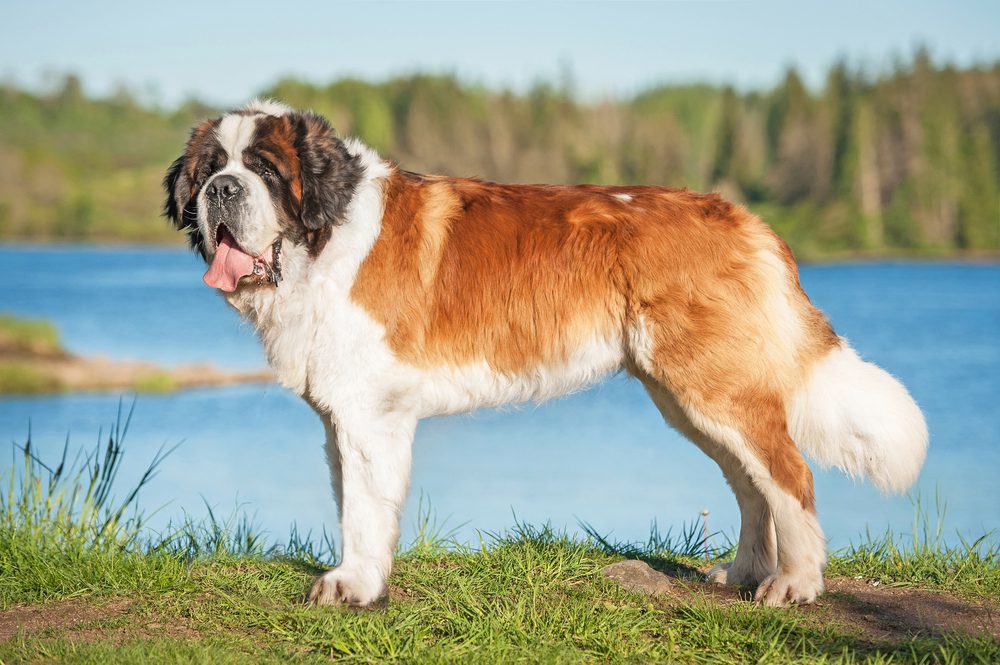


If you’re looking for a large dog, which tends to be a great option for children, a Saint Bernard may be the perfect fit! Saint Bernards are known for being gentle giants, with very calm demeanors and sturdy statures.
The large size of the Saint Bernard makes them excellent for deep pressure therapy for both children and adults, as well as mobility or balance issues which can sometimes accompany autism.
Saint Bernards are typically very patient and sweet dogs, but they can have stubbornness in their temperament. If you have experience training dogs or you’re planning on hiring a dog trainer, this should be no problem, but if this is your first time having a dog, you may want to be aware of the potential learning curve.
Something else to be aware of is since Saint Bernards are so large, they eat quite a lot, so you’ll need to be prepared to have a food budget to match their size!
German Shepherd
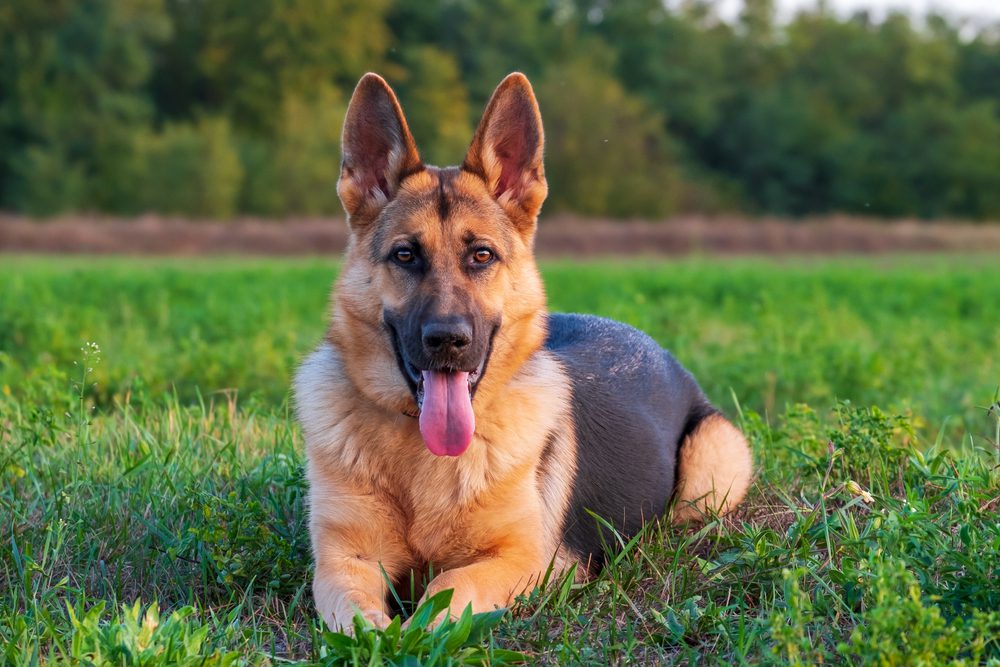


German shepherds are known for their intellect, which makes them great for learning complex tasks. They also tend to be less distractible than other dog breeds, which means they’ll have more focus when their handler gives commands. Both of these factors aid in making them ideal service dogs, especially for autism assistance work.
German shepherds have a long history of being protectors and guard dogs because of their loyalty, but ultimately they’re very gentle (even with strangers.) This can be good for public ventures, as they’ll likely have a good disposition.
Something else about German shepherds is that many of them tend to be good energy chameleons. For example, if their handler is energetic, they’ll match that energy, but they can also be calm when it’s needed.
While German shepherds can be calm when the moments call for it, they do need a lot of exercise to be happy. For most, service dog work should be enough to tire them out for the day, but you may need to take them out in their downtime to run around every so often.
Samoyed
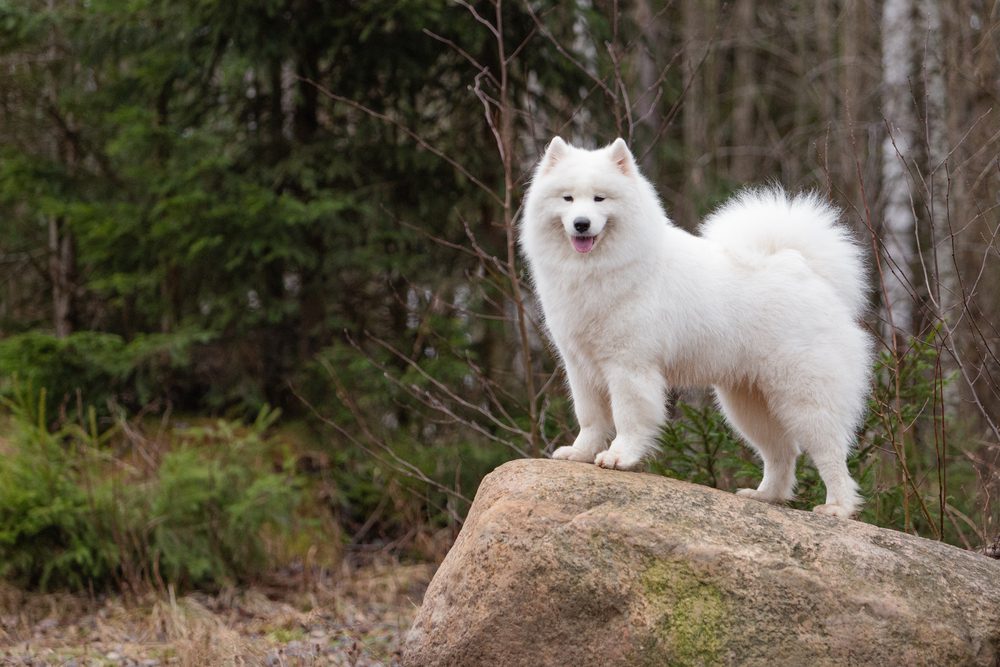


Samoyeds perpetually look happy with their big smiles! This breed tends to be highly intelligent, really friendly, and super loving, which makes them a great candidate for service dog work.
Something that makes Samoyeds great for autism assistance is the breed’s size. Being a larger dog is great for children who have autism, especially those who need extra balance or mobility support. Samoyeds can also give great deep pressure therapy to adults as well!
One thing to keep in mind about Samoyeds is that this breed tends to have very high levels of energy, despite their large stature. Depending on what you or your child’s day-to-day life entails, this may be a good thing, but if you’re looking for a dog that needs minimal stimulation and play time you may want to consider a mellower breed.
Old English Sheepdog
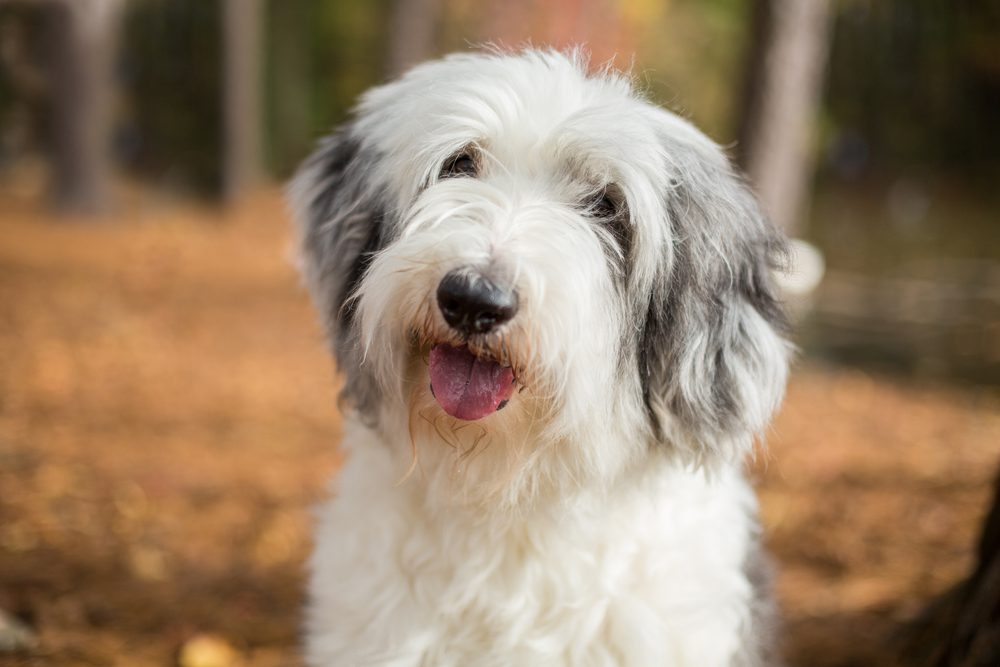


Old English sheepdogs have a family-oriented disposition and are medium in size, making them a great candidate for service dog work with autistic children. Their breed is known for their intellect and trainability, so they’ll pick up quickly on service dog tasks.
These dogs balance being goofy and being serious, so they’ll be able to fit into any situation. Having this range makes Old English sheepdogs great in low-key family get-togethers as well as busy crowds.
Old English sheepdogs do drool and shed a lot, so if anyone in your family is sensitive to dander, it may be a good idea to choose a different breed. These dogs also need to be groomed pretty frequently. However, if having a routine is part of your treatment, the practice of keeping your dog groomed may be good for that.
Boxer
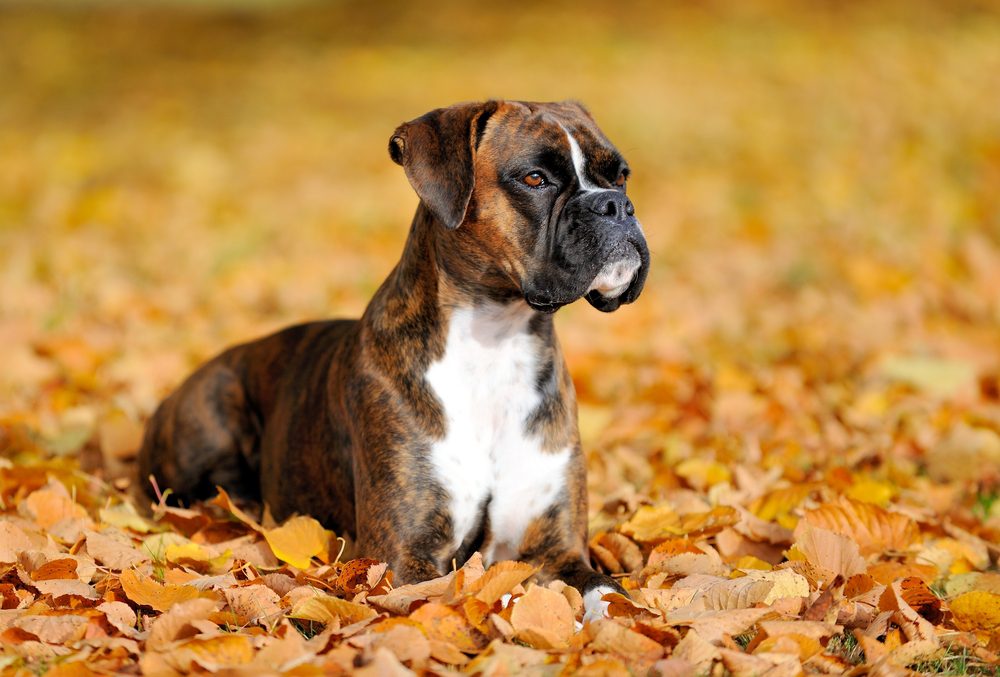


Boxers are famous for being great family dogs, especially those with children, because of their friendliness and patience. Their size is great for being able to provide deep pressure therapy if the child needs it.
Boxers also tend to be good with strangers, which makes them ideal for being in public with their handler. Some of them can still be protective though, so you’ll still want to make sure your pup gets proper socialization.
One thing to be aware of is the energy level of most Boxers. This can be good if your service dog has lots of tasks to do, but Boxers may need to be exercised each day after their work to stay happy. If you’re looking for a more calming breed, you may want to try a Boxer mix, or a different breed altogether.
Great Dane
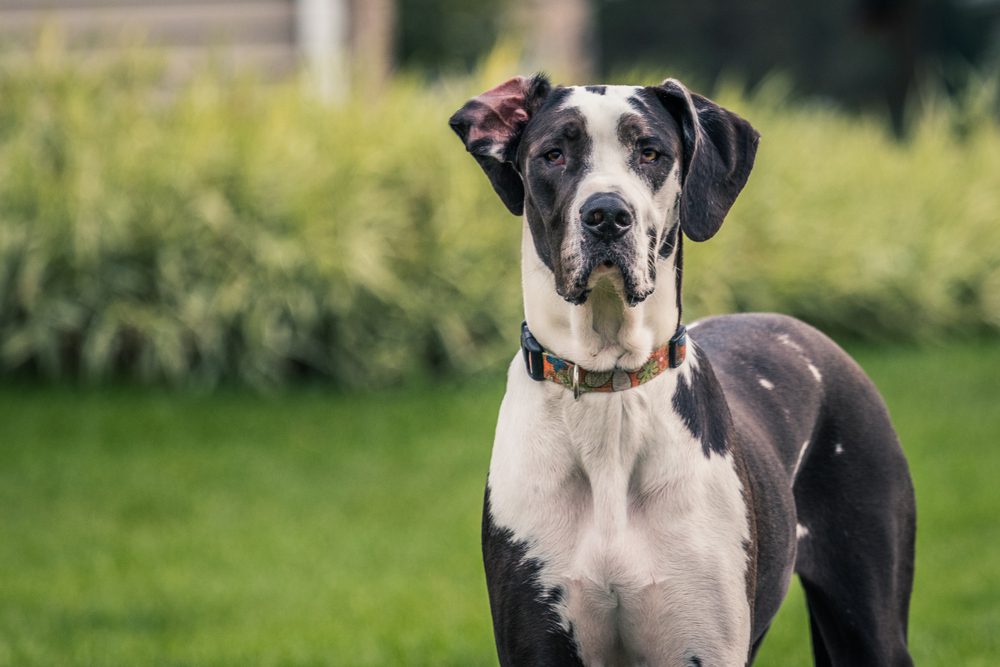


Before anything else, Great Danes are known for their massive size but they also tend to be very gentle, nurturing, and protective dogs. This combination makes them ideal for family life, and their trainability makes them excel in assistance work.
If calmness and snuggling are what you’re looking for with an autism assistance dog, Great Danes are excellent at delivering. Their size also makes them excellent for mobility and balancing tasks with both children and adults.
The size of a Great Dane is something to be aware of when you’re weighing your dog breed options, as Great Danes are regarded as one of one of the largest breeds. This means that you have to have a sizable food budget and understand that their lifespan tends to not be as long as other breeds.
Collie
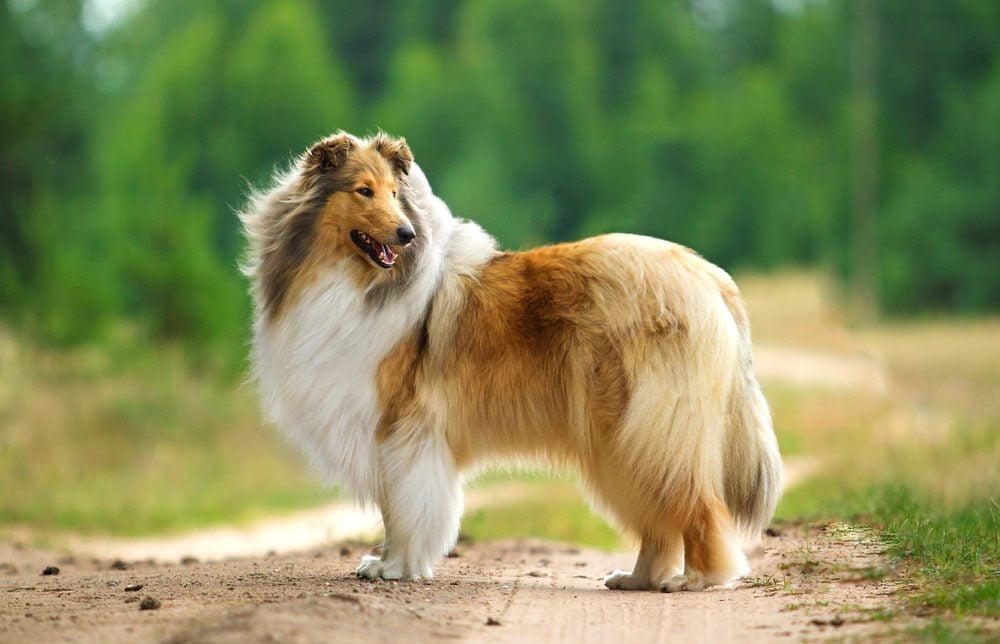


Collies are primarily known for being loyal and intelligent. They won’t wander off from their owners or handlers, so they tend to be a good choice for people new to dog ownership. Collies are mild-mannered, gentle, and typically very good with kids.
Something that makes Collies particularly suited for service dog work is their high levels of empathy. Collies are typically easy to train because of their intelligence, which is another aspect of theirs that makes them great for service dog work.
Collies do have a tendency to shed a lot because of their thick coats, and they need to be brushed regularly to prevent tangles. It should also be noted that Collies can have a hard time getting along with other animals in the house, like cats or birds, so if you have other pets you may want to consider a different breed.
Dogs for Autism
Adults and children on the autism spectrum may have trouble with communication and social relationships. It is not uncommon for people with ASD to also suffer from anxiety or depression.
This is where dogs come in: they provide friendship to those struggling to maintain such relationships with humans and comfort to those who may be dealing with depression or anxiety.
Anyone who has had a dog will know just how special the relationship between dog and human is. It is a true instance of unconditional love. Dogs do not judge, and they are incredible at adapting to us.
People on the autism spectrum may communicate a bit differently from people who aren’t on the spectrum, but dogs will not be bothered by this at all. They remain ever-loyal and loving companions.
